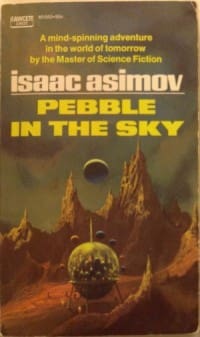By Paul Kupperberg
 I was listening to a writer being interviewed on NPR the other day and the interviewer asked Stock Question #27: “So out of all your books, which is your favorite?” The write responded with Stock Answer #27: “All my books are like my children. How do you pick a favorite?”
I was listening to a writer being interviewed on NPR the other day and the interviewer asked Stock Question #27: “So out of all your books, which is your favorite?” The write responded with Stock Answer #27: “All my books are like my children. How do you pick a favorite?”
Yeah. Sure. Look, every writer knows when they’ve screwed the pooch and written something that just doesn’t stack up against the rest of what they’ve done, or just flat out sucks. If you’re a believer in Sturgeon’s Law (“90% of everything is crud.”) than 90% of what every writer writes has to be crud (unless you’ve revised it as I have to make it Sturgeon’s Law–Now Improved With Face Saving Rationalization!: “90% of everything by everybody except me is crud.”). But even if you don’t accept the Law, I can understand using Stock Answer #27 instead of responding truthfully; why open yourself up to the follow-up question, “So which one of your books, etc. do you think isn’t so good?” Which can also be asked as, “Which of your books shouldn’t readers waste their money on?”
(See, this is why I only had the one kid.)
But to the question at hand: I do have some books, stories, comic books, whatever that I’ve written that I like more than others. I can’t really think of many things I’ve worked on that I outright hate, even if I wasn’t happy with it at the time I finished it (oh wait…I almost forgot The Adventures of Goggleman, an instructional comic I wrote in 1992 for the Power Tool Institute. I kid you not. “Always wear your safety goggles and always read, understand, and follow the owner’s manual!”). Usually, with the softening effect of a little time and emotional distance between the actual work and taking another look, I find it’s really not as bad as I thought. Maybe not my best but I usually put it down with an, at worst, mildly satisfied, “Well, maybe that didn’t suck as much as I thought.” (Usually, although there’ll be a few epic fails, like the one I discussed here, in an earlier blog post.)
Conversely, there are projects that I’ve pushed away from after typing “the end” and said, “Okay, this almost doesn’t suck!” (That’s understatement, so as not to jinx anything or, as my people say, put the kina horah, or evil eye, on it.)
 One such project was The Same Old Story (available, I’m obliged to remind you, right here from Crazy 8 Press). It was one of those times when, once I got going, everything just seemed to come together and roll merrily along to a wonderfully (to me) satisfying conclusion.
One such project was The Same Old Story (available, I’m obliged to remind you, right here from Crazy 8 Press). It was one of those times when, once I got going, everything just seemed to come together and roll merrily along to a wonderfully (to me) satisfying conclusion.
Another of my babies to which I can point with some pride is Jew-Jitsu: The Hebrew Hands of Fury, a humor book I wrote for Kensington Publishing in 2008. It’s written as an instruction manual for a Jewish-based martial arts but is, in reality, a repository of Jewish jokes, Yiddish humor, and silly plays on religious traditions. It’s no longer in print, but if you want to learn such moves as the Davening Headbutt, the Payess of Fury, the Deadly Punch in the Kishkes, and how to use the throwing star of David, it’s still available for the Kindle here.
The third of my babies was, if you’ll pardon the disturbing comparison, stillborn. In 2004, I signed with Byron Preiss’ iBooks to write a trilogy of Justice Society of America novels. Book One, JSA: Ragnarok was finished in July 2005, just weeks after Byron’s early, tragic death in a traffic accident. Others tried to keep iBooks going, but they weren’t able to hold the company together and were forced to file for Chapter 7 bankruptcy on February 22, 2006…the very week Ragnarok was supposed to go to the printer. I have a PDF of the uncorrected proof, and, within the last year or so, have been in touch with the publishing concern that acquired iBooks’ assets (Ragnarok included) about getting the book to market. However, the new company and DC haven’t been able to come to terms (DC owns the rights to the JSA; the other publisher owns the rights to the manuscript, meaning neither can publish the book without the cooperation of the other) so it’s unlikely Ragnarok will ever make it to print. (You can, however, check out a few excerpts I’ve posted to my website, here, here, here, and here.)
I really do love all my “children,” but as it is with the people we love in our lives, there are some I definitely like better than others. But don’t tell that to Goggleman. There’s really no reason to hurt his feelings.







